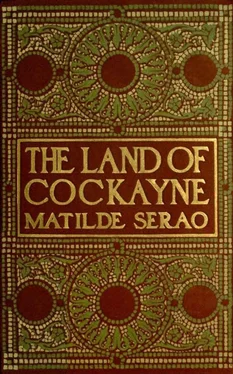Matilde Serao - The Land of Cockayne
Здесь есть возможность читать онлайн «Matilde Serao - The Land of Cockayne» — ознакомительный отрывок электронной книги совершенно бесплатно, а после прочтения отрывка купить полную версию. В некоторых случаях можно слушать аудио, скачать через торрент в формате fb2 и присутствует краткое содержание. Жанр: unrecognised, на английском языке. Описание произведения, (предисловие) а так же отзывы посетителей доступны на портале библиотеки ЛибКат.
- Название:The Land of Cockayne
- Автор:
- Жанр:
- Год:неизвестен
- ISBN:нет данных
- Рейтинг книги:3 / 5. Голосов: 1
-
Избранное:Добавить в избранное
- Отзывы:
-
Ваша оценка:
- 60
- 1
- 2
- 3
- 4
- 5
The Land of Cockayne: краткое содержание, описание и аннотация
Предлагаем к чтению аннотацию, описание, краткое содержание или предисловие (зависит от того, что написал сам автор книги «The Land of Cockayne»). Если вы не нашли необходимую информацию о книге — напишите в комментариях, мы постараемся отыскать её.
The Land of Cockayne — читать онлайн ознакомительный отрывок
Ниже представлен текст книги, разбитый по страницам. Система сохранения места последней прочитанной страницы, позволяет с удобством читать онлайн бесплатно книгу «The Land of Cockayne», без необходимости каждый раз заново искать на чём Вы остановились. Поставьте закладку, и сможете в любой момент перейти на страницу, на которой закончили чтение.
Интервал:
Закладка:
The first usher, the one who called out the ninety numbers, brought a long, narrow wooden board with five empty squares to the railing, such as bookmakers use on a race-course, whilst the other gave the urn its last twirl with all ninety numbers in it. The board was turned towards the crowd. Then the Councillor rang a bell; the urn stopped; another usher put a bandage over the white-clad infant's eyes; he slowly put his little hand into the open urn and searched for a minute only, quickly drawing out a ball with a number. Whilst the ball passed from hand to hand, a deep, dull, anguished sigh came out of those petrified bosoms down there.
'Ten!' shouted the usher, putting it quickly in the first square. A murmur and agitation among the crowd; all those who had hopes of the first drawing were disappointed. Another ring of the bell; the child put in its slender hand the second time. 'Two!' shouted the usher, announcing the number taken out and putting it into the second square. Some muttered oaths mingled with the rising murmur; all those who had played the second drawing were disappointed, and those who had hoped to take four numbers, those who had played the great terno in one, greatly feared to come out badly, so much so that, when the lad's small hand went into the urn the third time, someone called out in anguish:
'Search well; make a good choice, child.'
'Eighty-four!' shouted the usher, calling out the number and placing it in the third space. Here an indignant yell burst out, made up of oaths, lamentations, angry cries. This third number, being bad, was decisive for the drawing and the gamblers. With eighty-four, the hopes of all those who had played the first, second, and third drawing were frustrated; all those who had played the five sequence, fourths, the two treys, or these doubled, which is the hope and joy of Naples folk, hope and desire of all desperate players, and those that only play once on chance, saw they had missed it. The terno is the essential word of all these longings, needs, necessities, and miseries. A chorus of curses arose against bad luck, evil fate, against the lottery and those who believe in it, against the Government, against that bad boy with such unlucky hands. 'Serragliuolo! Serragliuolo!' was shouted from below, to insult him, and fists were shaken at him. The little one did not turn to look; he stood motionless, with his eyes down. Some minutes passed between the third and fourth numbers; it happened so every week. The third number brought the frightful expression of the infinite popular disappointment. 'Seventy-five,' the usher said in a feebler voice, putting the number drawn in the fourth space. Among the angry voices that would not be soothed, some hisses sounded revengefully. Abuse poured on the child's head, but the greatest curses were against the lottery, where one could never win, never, where everything is arranged so that no one ever wins, especially against poor people. 'Forty-three,' the usher called out for the last time, placing the fifth and last number. A last gust of rage among the people—nothing more. In a minute all the cold lottery machinery disappeared from the terrace: the children, the three authorities, the urn with the eighty-five numbers and its pedestal, tables, chairs, and ushers, all went out of sight, the glass and shutters of the great balcony were shut in a minute; only the cruel board remained, straight against the balustrade, with its five numbers—these, these, the great misfortune and delusion!
Very slowly and unwillingly the crowd cleared out of the court. On those most excited by gambling passions the wind of desolation had blown, and overthrown them all. They felt as if their arms and legs were broken; their mouth had a bitter taste from anger. Those who that morning had played all their money, feeling no need of eating, drinking, nor smoking, feeding themselves with vivid visions of Cockaigne, dreaming for that Saturday evening, Sunday, and all the days following, quite a bellyful of fat, rich dinners, tasting them in their imagination, held their hands feebly in their empty pockets. One could read in their desolate eyes the childish physical grief of the first pangs of hunger; and they had not, knew they could not get, bread to quiet their stomachs. Others, the maddest, fallen from the height of their hopes in a minute, experienced that long movement of mad anguish in which people will not, cannot, believe in bad luck. Their eyes had that wandering look that sees the shape of things no longer; their lips stammered incoherent words. It was these desperate fools who still kept their eyes on the board with the numbers, as if they could not yet convince themselves of the truth, and mechanically compared them with the long list of their tickets. The Cabalists, to conclude, did not go away yet; they held discussions among themselves, like so many philosophers or logicians, still wrapped up in lottery mathematics, where dwell the figure, the cadenze, the triple, the algebraic explanation of the quadrato Maltese, and Rutilio Benincasa's immortal lucubrations. But with those who went away, as with those who stayed, nailed to the spot by their excitement; those who discussed it violently, as with those who bent their heads, deadly white, courage all gone, without strength to move or think, the form of the desolation varied, but the substance of it was the same—deep, intense, making the inward fibres bleed, tending to destroy the very springs of life.
Michele, the lame shoeblack, still seated on the ground, with his black box between his crooked legs, had heard the drawing without getting up, hidden behind people who pressed around him. Now, while the crowd was slowly going off, he hung down his head, and the yellow shade of his rickety old face got green, as if all his bile had gone to his brain.
'Have you got nothing?' asked a dull voice beside him.
He raised his gray eyes with pink lids mechanically and saw Gaetano, the glove-cutter, who showed in his chalky face the depression of disappointed hopes.
'No, nothing,' said the shoeblack shortly, lowering his eyes.
'There is nothing for me, either. If you have a few sous for a combination, old fellow, I will give them back on Monday.'
'Where could I get them? If you get hold of ten, we could make up five each,' the shoeblack muttered desperately.
'Good-bye, old fellow! Good-bye!' said the glove-cutter in a rough voice.
While Gaetano was going off under the gateway, Donna Concetta came alongside of him, slow and grave, her eyes down, the gold chain waving on her breast and ringed fingers.
'Have you won nothing, Gaetano?' she asked with a slight smile.
'I have been hit by an arrow!' shouted he, provoked to be so near the usurer, who reminded him of all his wretchedness, annoyed by her question at such a moment.
'All right—all right,' she returned coldly. 'We see each other on Monday—don't forget.'
'I don't forget; I keep you in my heart like the Virgin,' he called out, alongside of her, in a hissing voice.
She shook her head as she went off. She did not come there for her own interests, because she never gambled; nor even to worry some of her debtors, like Gaetano. She came in her sister's interest, Donna Caterina, the holder of the small game, for she dared not show in public. Donna Caterina told her sister which numbers she dreaded most—that is to say, those she had played most on, for which she would have to pay the largest sums. Then Donna Concetta sent off a lad to her sister, who quickly made off, so as to pay no one. Three times already she had gone bankrupt so, with the gamblers' money in her pocket. She had fled once to Santa Maria, at Capua, once to Gragnano, once to Nocera dei Pagani, staying there two months. She had had the courage to come back and face the cheated gamblers, using audacity with some and giving a few sous to others, beginning the game again, while the robbed, cheated, and disappointed gamblers came back to her, incapable of denouncing her, seized by the fever again, or kept in awe by Donna Concetta, to whom they all owed money. So the concern went on. The money passed from one sister to another—from the one who held the bank and knew how to fail in time, to the money-lender who was daring enough to face the worst-intentioned of her debtors. Nor was her flight looked on as a crime, as cheating, by Donna Caterina and her customers; for did not the Government do the same thing, perhaps, on a larger scale? A gift of six million francs has been settled for each drawing for every ruota of eight: when, by a very rare combination, the winnings go above six millions, does not the Government fail too, making the entire profits smaller?
Читать дальшеИнтервал:
Закладка:
Похожие книги на «The Land of Cockayne»
Представляем Вашему вниманию похожие книги на «The Land of Cockayne» списком для выбора. Мы отобрали схожую по названию и смыслу литературу в надежде предоставить читателям больше вариантов отыскать новые, интересные, ещё непрочитанные произведения.
Обсуждение, отзывы о книге «The Land of Cockayne» и просто собственные мнения читателей. Оставьте ваши комментарии, напишите, что Вы думаете о произведении, его смысле или главных героях. Укажите что конкретно понравилось, а что нет, и почему Вы так считаете.












